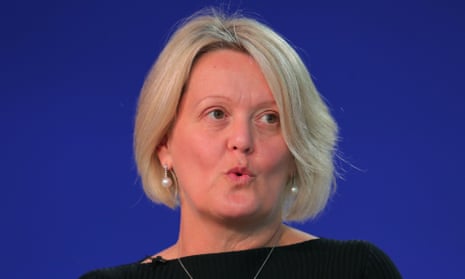NatWest is giving its bankers bigger bonuses this year after the group, still majority-owned by taxpayers, bounced back to a £4bn profit in 2021 as the economy recovered from the coronavirus pandemic.
The lender said it had increased its bonus pool to £298m, a 44% increase on a year earlier.
Alison Rose, the chief executive of NatWest, said the lender had shown “significant restraint” with its bonus pool compared with the rest of the banking industry, and added that the bank was “acutely aware of the challenges that many people, families and businesses continue to face up and down the country”, amid the cost of living crisis.
She said: “We operate in a competitive market and we have to pay fairly and competitively for the skills we have.”
Rose said a majority of NatWest’s staff, including its executive team, do not receive bonuses.
Rose’s total pay for 2021 was £3.6m, up from £2.6m a year earlier.
It came as NatWest reported statutory pre-tax profits of £4bn, a return to profitability after a £351m loss a year earlier, as the bank benefited from the UK’s economic recovery from the pandemic.
The bonus pool for 2021 was 3% lower than the £307m for 2019, before the pandemic.
Rose added the bonus pool was reduced in 2020 to reflect the bank’s performance during the first year of Covid, when it was loss-making.
She said the lender was aware of the cost of living crisis being experienced by its customers, in the face of rising inflation, but said it was “not seeing any signs of strain at the moment” among households and businesses.
“We’re not seeing a rise in the number of customers needing specialist help at this time,” Rose said. “But what we are very mindful of is the challenges that may be coming, challenges which customers haven’t faced before.”
NatWest tracks the calls made by customers and businesses to its helplines, according to the kind of help required by clients or the level of default, but Rose said there had not been an increase in requests for financial support.
“At the moment, customers are worried about rising bills and making a living and dealing with things they have not dealt with before,” she said.
Rose said the bank was contacting businesses to see how it could help to plan for and deal with rising interest rates and fluctuations in exchange rates.
NatWest said the vast majority of its business customers were still paying back Covid loans as expected.
The lender said 7% of the bounce-back loans provided to its customers had been paid back in full, while 90% were paying back on or ahead of schedule.
Meanwhile, NatWest said 98% of customers who had received larger loans – of up to £5m – during the pandemic, which were made available through the government’s coronavirus business interruption loan scheme, were paying these back on or ahead of schedule.
Bounce-back loans returned to the spotlight in late January after the shock resignation of the Treasury minister Lord Agnew, who accused the government of writing off more than £4bn in fraudulent Covid loans.
However, NatWest said it had only provided bounce-back loans to its existing customers and thought there were “very low” levels of fraud among the loans it had distributed.
NatWest, which is still majority-owned by the UK government, returned £1.7bn to taxpayers in dividends and share buybacks in 2021.
The taxpayer stake in the bank formerly known as Royal Bank of Scotland has reduced to just under 51%, and is expected to move below 50% in the coming months.
Rose said it was “in the government’s hands” when ministers would opt to sell down the remaining stake.
Earlier in February, NatWest announced it would shut 32 of its branches in England and Wales over the next year – including the RBS branch inside its own headquarters on Bishopsgate in the City of London – as its customers increasingly turn to mobile banking.
NatWest said 60% of its retail current account holders now only interact with it digitally, while it has been seeing strong growth in mobile payments and video banking. The bank said decisions about branch closures would be determined by customer behaviour.
